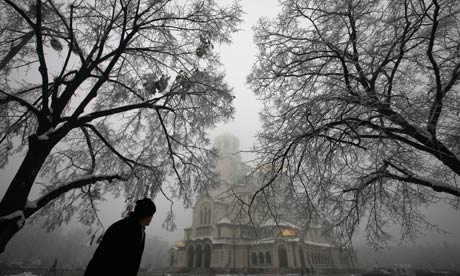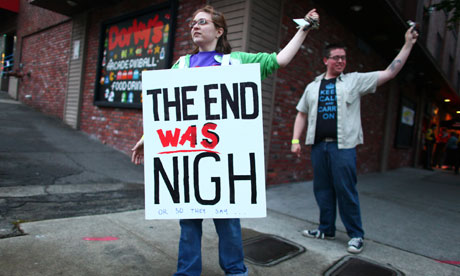
Living in a heathen state might not be as bad as religious believers had feared. If I've understood article eight of Julian Baggini's heathen manifesto correctly, many religious citizens should be able to affirm quite readily three features of the secular state that he summarises.
First, religion has a legitimate place in politics. Unlike those on the control-freak wing of secularism, Baggini has no desire to banish religious or other worldviews from public life or to stop their adherents invoking such beliefs in policy debates. So presumably it's fine, then, for Operation Noah's recent Ash Wednesday Declaration not only to cite the familiar grim statistics about climate change, but also to quote ancient Jewish sacred texts and lobby the government accordingly. By implication, it's equally legitimate for secular humanists seeking the legalisation of assisted suicide not just to confine themselves to the prosaic legal language of rights, but also to appeal to deeper and more expansive convictions such as that human dignity ultimately resides in the capacity for moral autonomy (a view represented in chapter 2 of the Falconer commission report).
Second, while democratic debate should thus not be arbitrarily hampered by restrictions on religious or other worldview-based ideas, the state "should not give any special privilege to any particular sect or group, or use their creeds as a basis for policy". Actually, the two parts of that claim are distinct. One is that the state should treat groups holding various worldviews even-handedly, for example by avoiding funding or granting access to one while arbitrarily excluding others. The other is that the state should refrain from officially invoking any worldview or creed in publicly justifying any of its policies. So state officials shouldn't quote the Bible as official justification for the 2008 Climate Change Act, and nor should they cite a humanist doctrine of the primacy of moral autonomy in support of a law allowing assisted suicide. In other words, while we citizens can appeal to such grounds, ministers and civil servants shouldn't, even if they personally endorse them.
Third, in democratic politics, people should "formulate and justify policy in terms that all understand, on the basis of principles that as many as possible can share". Christian philosopher Christopher Eberle calls this the "obligation to pursue public justification" and commends it as part of a wider "ideal of conscientious engagement". That is, citizens who respect each other as equals should do their best to appeal to public norms their fellow citizens can affirm or at least acknowledge as valid, and not just for the obvious pragmatic reason that they might actually be listened to.
Many religious citizens will thus be grateful to Baggini for marking out some promising shared ground. But when we try to specify the precise meaning of the second and third features of his secular state, we rapidly find ourselves in territory that is hotly contested both within and between religious and secular worldviews. "State neutrality" implies some notion of equal treatment. But while it plainly rules out the official "establishment" of a worldview – Christianity in the Roman empire, Islam in Iran, or atheistic communism in the USSR – it is far from obvious what else it implies. Does it exclude all and any state funding of faith-based schooling, as in the US, or does it require a pluralistic European model in which several religious and worldview-based schools are funded proportionately? Does it mandate equal recognition of all conceptions of "marriage" or only those honouring the equality of men and women (or men and men, and women and women)? Appealing to "neutrality" doesn't solve questions like these, but merely prods at a hornets' nest of vigorous disagreement. Neutrality itself is an empty concept that is parasitic upon a prior social ontology that takes a view on the nature of the entities among which the state is supposed to be neutral.
Specifying what "public justification" amounts to is no less demanding. After an exhaustive analysis of what the term might actually require of participants in democratic debate, Eberle concludes that both religious and secular citizens may, despite their best efforts, find themselves coming up with justifications that turn out to seem invalid by many members of the public. And this isn't a sign of epistemic failure, only of the inherent limits of rational communication in a morally fragmented culture. The problem isn't unintelligibility: any passably educated secular humanist can make sense of an appeal to an ancient Hebrew text, just as a reasonably well-informed Muslim can make sense of a Kantian conception of human dignity. The problem is incompatibility; the deep chasm separating one citizen's deepest worldview commitments from another's.
More troublingly, the requirement to justify one's policy commitments only in terms of supposedly "shared principles" can serve to entrench the discursive hegemony of whatever happens to be the current majority position – such as the stubbornly persistent yet irrational faith, shared by every party except the Greens, that endless growth of GDP is the only way out of recession and even the only route to address global warming. Marginalised minorities know all about the power of such hegemonic convictions when their dissenting demands run up against what a complacent majority takes as self-evidently true.
The high principle of article eight of the heathen manifesto has flagged up an important debate. Let's now take up the difficult work of analysing what it might actually mean on the ground.
-----
Atheists, please read my heathen manifesto

In recent years, we atheists have become more confident and outspoken in articulating and defending our godlessness in the public square. Much has been gained by this. There is now wider awareness of the reasonableness of a naturalist world view, and some of the unjustified deference to religion has been removed, exposing them to much needed critical scrutiny.
Unfortunately, however, in a culture that tends to focus on the widest distinctions, the most extreme positions and the most strident advocates, the "moderate middle" has been sidelined by this debate. There is a perception of unbridgeable polarisation, and a sense that the debates have sunk into a stale impasse, with the same tired old arguments being rehearsed time and again by protagonists who are getting more and more entrenched.
It is time, therefore, for those of us who are tired of the status quo to try to shift the focus of our public discussions of atheism into areas where more progress and genuine dialogue is possible. To achieve this, we need to rethink what atheism stands for and how to present it. The so-called "new atheism" may have put us on the map, but in the public imagination it amounts to little more than a caricature of Richard Dawkins, which is not an accurate representation of the terrain many of us occupy. We now need something else.
This manifesto is an attempt to point towards the next phase of atheism's involvement in public discourse. It is not a list of doctrines that people are asked to sign up to but a set of suggestions to provide a focus for debate and discussion. Nor is it an attempt to accurately describe what all atheists have in common. Rather it is an attempt to prescribe what the best form of atheism should be like.
1 Why we are heathens
It has long been recognised that the term "atheist" has unhelpful connotations. It has too many dark associations and also defines itself negatively, against what it opposes, not what it stands for. "Humanist" is one alternative, but humanists are a subset of atheists who have a formal organisation and set of beliefs many atheists do not share. Whatever the intentions of those who adopt the labels, "rationalist" and "bright" both suffer from sounding too self-satisfied, too confident, implying that others are irrationalists or dim.If we want an alternative, we should look to other groups who have reclaimed mocking nicknames, such as gays, Methodists and Quakers. We need a name that shows that we do not think too highly of ourselves. This is no trivial point: atheism faces the human condition with honesty, and that requires acknowledging our absurdity, weakness and stupidity, not just our capacity for creativity, intelligence, love and compassion. "Heathen" fulfils this ambition. We are heathens because we have not been saved by God and because in the absence of divine revelation, we are in so many ways deeply unenlightened. The main difference between us and the religious is that we know this to be true of all of us, but they believe it is not true of them.
2 Heathens are naturalists
Heathens are not merely unbelievers: we believe many things too. Most importantly, we believe in naturalism: the natural world is all there is and there is no purposive, conscious agency that created or guides it. This natural world may contain many mysteries and even unseen dimensions, but we have no reason to believe that they are anything like the heavens, spirit worlds and deities that have characterised supernatural religious beliefs over history. Many religious believers deny the "supernatural" label, but unless they are willing to disavow such beliefs as in the reality of a divine person, miracles, resurrections or life after death, they are not naturalists.3 Our first commitment is to the truth
Although we believe many things about what does and does not exist, these are the conclusions we come to, not the basis of our worldview. That basis is a commitment to see the world as truthfully as we can, using our rational faculties as best we can, based on the best evidence we have. That is where our primary commitment lies, not the conclusions we reach. Hence we are prepared to accept the possibility that we are wrong. It also means that we respect and have much in common with people who come to very different conclusions but have an equal respect for truth, reason and evidence. A heathen has more in common with a sincere, rational, religious truth-seeker than an atheist whose lack of belief is unquestioned, or has become unquestionable.4 We respect science, not scientism
Heathens place science in high regard, being the most successful means humans have devised to come to a true understanding of the real nature of the world on the basis of reason and evidence. If a belief conflicts with science, then no matter how much we cherish it, science should prevail. That is why the religious beliefs we most oppose are those that defy scientific knowledge, such as young earth creationism.Nonetheless, this does not make us scientistic. Scientism is the belief that science provides the only means of gaining true knowledge of the world, and that everything has to be understood through the lens of science or not at all. There are scientistic atheists but heathens are not among them. Science is limited in what it can contribute to our understanding of who we are and how we should live because many of the most important facts of human life only emerge at a level of description on which science remains silent. History, for example, may ultimately depend on nothing more than the movements of atoms, but you cannot understand the battle of Hastings by examining interactions of fermions and bosons. Love may depend on nothing more than the physical firing of neurons, but anyone who tries to understand it solely in those terms just does not know what love means.
Science may also make life uncomfortable for us. For example, it may undermine certain beliefs about free will that many atheists have relied on to give dignity and autonomy to our species.
Heathens are therefore properly respectful of science but also mindful of its limits. Science is not our Bible: the last word on everything.
5 We value reason as precious but fragile
Heathens have a commitment to reason that fully acknowledges the limits of reason. Reason is itself a multi-faceted thing that cannot be reduced to pure logic. We use reason whenever we try to form true beliefs on the basis of the clearest thinking, using the best evidence. But reason almost always leaves us short of certain knowledge and very often leaves us with a need to make a judgment in order to come to a conclusion. We also need to accept that human beings are very imperfect users of reason, susceptible to biases, distortions and prejudices that lead even the most intelligent astray. In short, if we understand what reason is and how it works, we have very good reason to doubt those who claim rationality solely for those who accept their worldview and who deny the rationality of those who disagree.6 We are convinced, not dogmatic
The heathen's modesty about the power of reason and the certainty of her conclusions should not be mistaken for a shoulder-shrugging agnosticism. We have a very high degree of confidence in the truth of our naturalistic worldview. But we do not dogmatically assert it. Being open to being wrong and to changing our minds does not mean we lack conviction that we are right. Strength of belief is not the same as rigidity of dogma.7 We have no illusions about life as a heathen
Many people do not understand that it is possible to lead a meaningful, happy life as a heathen, but we maintain that it is and can point to any number of atheist philosophers and thinkers who have explained why this is so. But such meaning and contentment does not inevitably follow from becoming a heathen. Ours is a universe without guarantees of redemption or salvation and sometimes people have terrible lives or do terrible things and thrive. On such occasions, we have no consolation. That is the dark side of accepting the truth, and we are prepared to acknowledge it. We are heathens because we value living in the truth. But that does not mean that we pretend that always makes life easy or us happy. If the evidence were to show that religious people are happier and healthier than us, we would not see that as any reason to give up our convictions.8 We are secularists
We support a state that is neutral as regards people's fundamental worldviews. It is not neutral when it comes to the shared values necessary for people of different conviction to live and thrive together. But it should not give any special privilege to any particular sect or group, or use their creeds as a basis for policy. Politics requires a coming together of people of different fundamental convictions to formulate and justify policy in terms that all understand, on the basis of principles that as many as possible can share.This secularism does not require that religion is banished from public life or that people may not be open as to how their faiths, or lack of one, motivate their values. As long as the core of the business of state is neutral as regards to comprehensive worldviews, we can be relaxed about expressions of these commitments in society at large. We want to maintain the state's neutrality on fundamental worldviews, not purge religion from society.
9 Heathens can be religious
There are a small minority of forms of religion that are entirely compatible with the heathen position. These are forms of religion that reject the real existence of supernatural entities and divinely authored texts, accept that science trumps dogma, and who see the essential core of religion in its values and practices. We have very little evidence that anything more than a small fraction of actual existent religion is like this, but when it does conform to this description, heathens have no reason to dismiss it as false.10 Religion is often our friend
We believe in not being tone-deaf to religion and to understand it in the most charitable way possible. So we support religions when they work to promote values we share, including those of social justice and compassion. We are respectful and sympathetic to the religious when they arrive at their different conclusions on the basis of the same commitment to sincere, rational, undogmatic inquiry as us, without in any way denying that we believe them to be false and misguided. We are also sympathetic to religion when its effects are more benign than malign. We appreciate that commitment to truth is but one value and that a commitment to compassion and kindness to others is also of supreme importance. We are not prepared to insist that it is indubitably better to live guided by such values allied with false beliefs than it is to live without such values but also without false belief.11 We are critical of religion when necessary
Our willingness to accept what is good in religion is balanced by an equally honest commitment to be critical of it when necessary. We object when religion invokes mystery to avoid difficult questions or to obfuscate when clarity is needed. We do not like the way in which "people of faith" tend to huddle together in an unprincipled coalition of self-interest, even when that means liberals getting into bed with homophobes and misogynists. We think it is disingenuous for religious people to talk about the reasonableness of their beliefs and the importance of values and practice, while drawing a veil over their embrace of superstitious beliefs. In these and other areas, we assert the right and need to make civil but acute criticisms.And although our general stance is not one of hostility towards religion, there are some occasions when this is exactly what is called for. When religions promote prejudice, division or discrimination, suppress truth or stand in the way of medical or social progress, a hostile response is an appropriate, principled one, just as it is when atheists are guilty of the same crimes.

